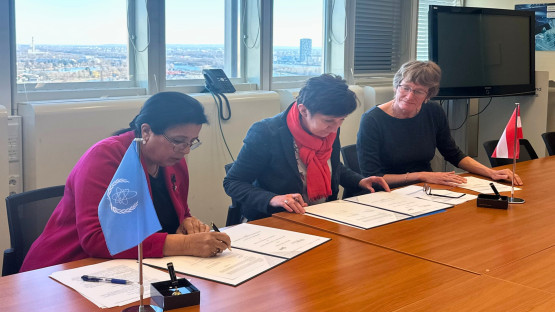A new agreement between the IAEA and the Vienna University of Natural Resources and Life Sciences aims to strengthen greenhouse gas monitoring to help reduce emissions.
Greenhouse gases such as carbon dioxide and methane are key drivers of climate change, contributing to rising global temperatures and environmental instability. The IAEA with its expertise in high-precision environmental measurements, is collaborating with the specialists at the university, known locally as BOKU, to enhance research, training and capacity-building efforts through stable isotope analysis.
Stable isotopes are variants of an element that remain unchanged over time, and each stable isotope possesses a distinct signature that allows scientists to trace its origin. By following this signature, scientists can identify specific sources of greenhouse gases, track their movement through the environment and evaluate the impact of mitigation strategies.
“This partnership with the IAEA significantly enhances our ability to apply cutting-edge stable isotope techniques to track and reduce greenhouse gas emissions. It strengthens BOKU’s scientific research and our contribution to global climate action through improved monitoring and capacity-building,” said Ursula Nopp-Mayr, head of the BOKU Department of Ecosystem Management, Climate and Biodiversity.
The new arrangement not only fosters a collaborative space for scientific research but also focuses on building a foundation to encourage countries to address climate change using nuclear sciences and applications.
“The significance of this partnership extends far beyond the IAEA and BOKU,” said Najat Mokhtar, Deputy Director General and head of the Department of Nuclear Sciences and Applications at the IAEA. “By sharing knowledge expertise, and innovative methodologies, we are empowering countries to contribute more effectively to global climate action.”
A laser spectrometer was recently installed in a central city cell phone tower in Vienna to monitor greenhouse gas emissions. This instrument marks the initial phase of establishing research stations in the city centre and its surroundings to measure methane and carbon dioxide fluxes and concentrations.
This Practical Arrangement grants both the IAEA and BOKU access to each other’s resources while also paving the way for new opportunities and collaboration for both the IAEA and national institutions.




